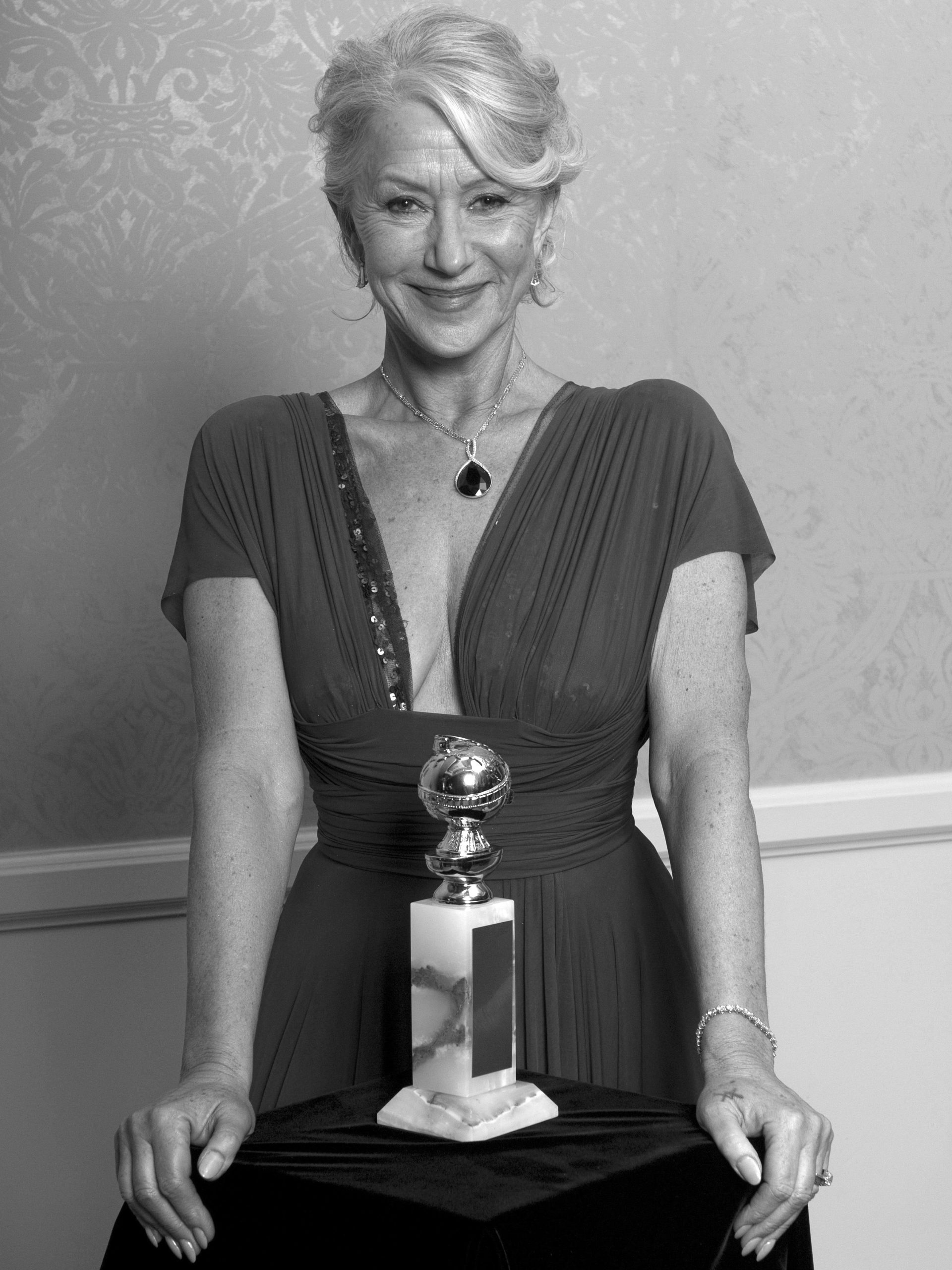
- Golden Globe Awards
Helen Mirren, 2006 on Queen Elizabeth – Out of the Archives
Helen Mirren won a Golden Globe in 2006 as Best Actress in a drama for The Queen directed by Stephen Frears from a screenplay by Peter Morgan with Michael Sheen playing Prime Minister Tony Blair. When Queen Elizabeth II passed away on September 8, the British actress wrote on her Instagram: “We mourn a woman, who, with or without the crown, was the epitome of nobility.” We went back into our extensive HFPA archives of exclusive interviews that started being recorded in 1971, and selected quotes from what Mirren said to the journalists of the Hollywood Foreign Press in 2006, when she met with us twice, for Elizabeth I, the British miniseries directed by Tom Hooper, then for The Queen.
The movie only covers two weeks of Queen Elizabeth’s life in 1997, following the death of Princess Diana on August 31, and the British actress said she did not approve or condemn the Queen’s behavior at the time: “I didn’t go either way, I didn’t have an opinion when all of that was happening, I didn’t judge her or vilify her. Luckily, in those two weeks I wasn’t in England, I was in America, so I could look at it through the lens of American media, which was very healthy, I was looking at it all through a slightly bemused attitude. I certainly had no particular opinion about what the royal family should or shouldn’t be doing, it wasn’t any of my business. I thought they must be going through a terrible, conflicted trauma, when the whole thing was turned upside down because suddenly Diana was a martyr and a saint.”
Mirren was apprehensive about playing this role, even though the previous year she had played Queen Elizabeth I, who ruled England from 1533 to 1603, in a British television miniseries directed by Tom Hooper: “It was the most intimidating role I’ve ever played. Elizabeth I was a much more emotional role, but this was more frightening to me because Elizabeth II is so well known, she’s an icon all over the world. Everybody knows what she looks like, what she sounds like, so I knew that I had to at least get those things right, and hopefully go way beyond the simple impersonation of the Queen. There is a great outpouring of love and respect for her now, but the film that we made dealt with her darkest hour, that period when she was extremely unpopular, if not hated, in that two weeks after Diana died; so it just shows how monarchs’ popularity really is a rollercoaster ride. Also, the British people have a very intense love/hate relationship with the monarchy and with this present royal family, it’s a tense and an emotional relationship, so it’s a dangerous subject to wander into as an actress, and I was very nervous at the thought of it.”
The actress described some similarities between the two very different queens, Elizabeth I, which she defined as “a complete dictator,” and Elizabeth II, a monarch with a profound sense of duty: “I got lucky that I played those two Elizabeths one after the other, that was an extraordinary synchronicity for me, and they were such different people and personalities, but at the same time bound very closely to each other in a way. They share an absolute steady commitment to their role as monarch, they are unwavering in their intrinsic and deep belief that they are in the right place at the right time, that they should be the monarch. Both Elizabeths were confident and sure within their minds and utterly committed to their role as monarch. Queen Elizabeth II believes in duty as a way of life, that can lead you towards a righteous path, almost in a religious sense. She absolutely believes in God, goes to church and that’s partly because of her confidence in her role, she does believe that God wants her to be there. As for Elizabeth I, the reason she was so traumatized by having to execute Mary, Queen of Scots, was because she was a God-anointed Queen. And in that world of monarchy, you have to embrace that, so they truly believe that God has chosen you for this role, and you must fulfill it to the best of your abilities.”
Helen Mirren was appointed a DBE, Dame of the British Empire in 2003, at Buckingham Palace, but she revealed that it was not Queen Elisabeth who bestowed that honor upon her: “Actually I got my honor from Prince Charles, not from the Queen. He was the person who did the ceremony. Once you’re given a Damehood or a Knighthood, I don’t think they can take it away from you, even if you do something really bad. For our movie The Queen, the writer Peter Morgan did his research, talked to as many people as he could, and the script that he wrote is a sensitive approach to the Queen; it was funny but human and that was why I agreed to do it. I wouldn’t have done it if I hadn’t felt that the film didn’t betray her. It’s great that we have free speech, but within a free speech environment, it’s very easy to take cheap shots at people, be cruel and venal and lie about people.”
Mirren thought that the early feminists’ belief, that women leaders would be kinder than men, remains to be proven: “Women are very cruel, but in a different way to men, and women’s cruelty can be more pernicious in a way because it’s often more psychological. Men’s cruelty is very upfront, very obvious and very physical, while women’s cruelty can be sneaky. In the overall world, if you look at most of the disasters, the cruelty in the world is perpetuated by men, but if women had the same kind of power, who knows? I wouldn’t like to make assumptions about that.”